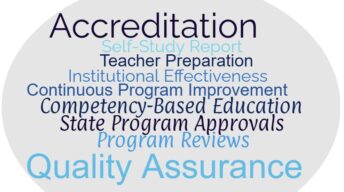Preparing for an accreditation site visit is always stressful for university faculty and staff, even under the best of circumstances. Depending on whether we’re talking about a regional accrediting body, a state compliance audit, or a discipline-specific accreditor, there are certain processes and procedures that must be followed. For the sake of brevity, this piece will focus on one discipline–that of teacher preparation–using the Council for the Accreditation of Educator Preparation (CAEP) as the sample accrediting body.
There are some important topics to be covered during a pre-visit conference call between the site team lead, the education preparation provider (EPP), and state representatives. By the end of this call, all parties should be “on the same page” and should be clear regarding what to expect in the upcoming site visit. Here are the topics that are essential to cover:
- Any general questions the EPP has regarding completion of the Addendum
- Confirm Addendum submission date
- Review and revise draft visit schedule
- Travel Details
- Confirm preferred airport
- If arrival and departure times coincide, team prefers to pick up a rental car at the airport and provide their own transportation during the site visit.
- Otherwise, EPP will need to make ground transportation arrangements.
- Reminder per CAEP guidelines: No receptions, banquets, poster sessions, dinners with EPP representatives, etc.
- School Visits
- Not required, but generally requested by the team if there are concerns regarding clinical experiences. Typically limit of 2 (from different grade levels such as 1 Elem & 1 HS)
- Should not require significant drive time
- EPP should provide a guide (typically faculty) to drive and serve as host/hostess
- Usually should take no more than 1 hour on-site at school
- Work Room at Hotel and on Campus
- Must be secure and private; lockable.
- Only site team members and state representatives are to enter the work rooms.
- Conference table large enough to accommodate all team members and state representatives
- Printer, secure wifi, LCD or HDTV projector
- Shredder
- Basic office supplies (i.e., stapler, paper clips, post-its, note pads, pens, highlighters, etc.)
- Food/Snacks
- There should be healthy snacks and beverages (i.e., bottled water, coffee, soda) in the work room at the hotel and on campus.
- The team will eat breakfast at the hotel each morning.
- If at all possible, the team will want to remain on campus for lunch, with the ideal arrangement to have lunch catered either in the workroom or in an adjacent room.
- The EPP should suggest a variety of restaurants within easy driving distance of the hotel for dinner each night.
- Interviews
- Generate interviewee list. Examples include:
- Dean
- Assessment Director
- Field Experiences Coordinator
- Full-Time Faculty
- Key Adjunct Faculty
- Current candidates representing multiple programs
- Program completers representing multiple programs
- Cooperating teachers from field experiences
- Clinical supervisors
- P-12 partners (i.e., superintendents, principals, teachers, etc.)
- Other:
- Interview Rooms
- Depending on final schedule, 3 rooms may be needed simultaneously.
- Should have a door for privacy
- EPP representatives should not attend interviews with candidates, program completers, or cooperating teachers
- EPP should prepare sign-in sheets for each interview.
- A staff member should be responsible for get all participants to sign in and then leave the room.
- All sign-in sheets should be sent to the site team lead.
- Requests for Additional Information or Data
- All requests should flow from and back to the site team lead.
- Generate interviewee list. Examples include:
There will be additional items to discuss but these are the most essential. Remember–advanced preparation is one key to a successful site visit. Do your homework and know what is required. Get organized. Appoint someone with experience to coordinate the event. Start well in advance. And if in doubt, hire a consultant. Earning accreditation is crucial to an institution’s overall success and should never be taken lightly.
###
About the Author: Dr. Roberta Ross-Fisher has expertise in educator preparation, CAEP accreditation, and competency-based education. A former public school teacher and college administrator, Roberta is now an educational consultant and adjunct professor.

